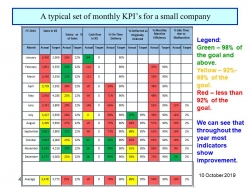How many companies have the CEO doing maintenance on complex machines? Or one of the executives? The truth is I've met very few owners, of small or very small companies, who do maintenance themselves. These are always very small companies, because owners who do maintenance instead of managing, will not be able to develop the company. In any case, these will be a minority of companies.
I assume you've never seen the CEO of a medium-sized company do maintenance themselves. And indeed, why should CEOs do maintenance? Do they know so much about machines to be able to fix them or replace broken parts?
And What about the Maintenance of the Human "Machine"?
But wonder of wonders, CEOs who aren’t machine-maintenance people, are sure they "know enough", or "know best", how to maintain the "human machines" in their company. And if not the CEO, then one of the executives will be able to do it, in addition to their regular job.
The employees, those "human machines", are much more complex than the most complex machines in your company.
Not only are we very complex creatures, but we, the human resources, are the most influential part of every company.
The Human Factor is the Most Important for Profits
Everything that happens in a company depends on the human factor. On employees' motivation, their dedication, their efficiency. And I'm not only talking about the production floor. Think about costumer representatives, in HQ or in service centers (or out-sourced service providers) – how do they answer clients? What's their tone, pleasant or angry? Think about how your company's performance is dependent on employee stability and absenteeism rates.
In today's competitive market, a company's comparative advantage is, often, a collection of little things, most of which are results of the above factors. The employees. Dedicated employees who are engaged create a considerable advantage over the competition. Furthermore, dedicated employees can move the company from a small loss to a small profit, or even a big one.
Let's Look at a Few Examples of the Great Importance of the Human Factor
I know a certain company, which a few years ago had its share of hardship because of a lack of employee engagement. This showed itself in many absences and in low quality and efficiency. Instead of working to create engagement, the company spent a lot of money on CNC machines. The entire production line became monitored and measured. And the result was that not much changed. Improvement was marginal. Again they had to deal with the same difficulties: many absences and low quality and efficiency. Because even the most cutting-edge robot requires a skilled operator. Only then did they look inwards, towards the employees.
An employee of another company used to stop the supply of material in order to rest. After twenty minutes the machines would stop, and it took management a while to realize what was happening. Only after installing cameras they discovered that an employee was sabotaging production.
At another company, an employee who asked for a raise and was denied, found a way to cheat the time monitoring system. He would record late shifts over the weekend, even though he wasn't at work at the time. The fraud was only discovered by accident, and the employee was fired.
You can of course install cameras and other monitoring devices at every spot and following every employee. But that is not the correct way, at the very least because it doesn’t tackle employee motivation. In addition, the goal isn’t to police employees and fire those who fail. The goal is to promote employee engagement and get them to contribute to the company.
Putting Employees in the Center
Jack Welch, who was the CEO and chairman of General Electric for 20 years, and raised its worth to 410 billion dollars – writes in his book Winning: The Ultimate Business How-To Book, that in a talk he gave in Mexico City in front of 5,000 HR directors, a question was asked about the role of the HR department.
His answer was immediate: the HR director should be the second most important person in any organization. For a CEO, the HR director's position should be equal to that of the CFO.
After this answer, the audience fell silent. He was surprised by the silence and asked – is this not what happens in your companies? And asked for a show of hands – how many worked for a company where the CEO saw the HR director and the CFO as having equal value. 50 hands went up. 50 out of 5,000! 1 percent!
And in Israel?
I'm very well acquainted with dozens of companies. In less than a third, there's an HR director. Employees and managers are the most important factor for a company's success, and in two-thirds of companies there's no HR director.
Even in companies that do have one, not all include them in management meetings, and only in a small minority does their status come near to what Jack Welch described.
Large companies with hundreds of employees will usually have an HR director. Mid-sized companies, with 150 employees or more, will not always have one. Small companies will have a part time HR person only if they understand the importance of the human factor and how sought after good employees are. Usually, such companies will be high-tech companies, or start-ups. In traditional industries – this will be rare.
What Difference Can an HR Director Make?
Firstly, the very existence of an executive focused of human resources, listening to employees, and tasked with the responsibility of promoting their engagement – is already a very important step. But it's only the beginning. An HR director's main job is to engage employees with company goals and create motivation, which is the most important factor for employee stability (lower turn-over rates), preventing absences, and efficient and quality work.
Let's Look and an HR Director's Job Description
Reporting to the CEO.
Expected Results:
- In charge of contracts complying with the law. This is a mostly technical clause, but is very important. In many companies without an HR manager, labor laws aren’t followed. For example, those to do with working hours and breaks.
- Decreasing turn-over rates and increasing employees' commitment to company-goals. This is the most important part of an HR manager's job, and it's a dynamic and never-ending one. It requires initiative, and continues throughout the HR manager's years of employment. It doesn’t have the technical aspect which characterize other clauses. This is what differentiates a great HR manager from a good one.
- Creating procedures for onboarding and for terminating employment. When an employee starts working for the company, first impressions will have an effect on their stability. The way employment is ended is also important, first in order not to leave open ends, and second because of the way this is perceived. The employees that stay with the company see the way employees who are fired or who leave are treated, and this affects their view of the company. This is essentially a technical clause, to do with setting proper procedures and following them.
- Maintaining the necessary work-force for every department. This also is a mostly technical clause.
- Offering solutions for manager-employee conflicts, in keeping with the law. Here there is a need for creativity, and a special need for the HR director to be well-versed in the goings-on in the company.
- Responsibility for monitoring time-sheets and pay-slips. For example, sick-days, vacations, shifts, overtime, etc. Again, this is a mostly technical clause.
- Conducting surveys and yearly performance reviews. This is an important issue, which affects employees' engagement and investment in company goals. Not all CEOs are interested in receiving feedback, or in conducting performance reviews. But this is important, and HR directors must promote it even when there's resistance.
- Conducting required training including onboarding procedures (seminars and training sessions). The Content is determined by the appropriate VP, the HR director's role is to execute the session plan.
- In charge of sexual harassment prevention.
- Recruiting and sorting employees for all departments. This is a skilled and highly important role. VPs often attempt to conduct interviews, but they haven’t been trained in it and do it poorly. An HR director should be trained in this and be in charge of recruiting employees.
Authority:
- To take part in all termination processes and stop any unlawful conduct.
- Recognize and stop all unlawful hiring practices.
- Manage sorting of new employees and bring candidates to the direct manager for final approval.
KPIs for the HR director:
- Increased employee satisfaction (as shown in surveys).
- Reduced turn-over rates (this is one of the indicators of employee motivation).
- Reduced employee absences (this is the other indicator of employee motivation).
- Work to bring procedures in line with relevant laws.
- Reduced employee recruitment times.
Each of these indicators should have a quantitative value as the goal to work towards.
Summary and Recommendation
A company’s employees (from the lowest to the highest ranking) are always the most important factor in creating profits and a relative advantage over the competition.
Unfortunately, many CEOs don’t realize the importance of getting employees engaged and invested in company goals, and in developing high motivation. Motivated and engaged employees work efficiently, produce quality, are less absent, and stay with the company longer. Of about a hundred companies I know well, only a third have an HR director, and those are usually the largest companies in the market.
When you appoint an HR director, I recommend you choose excellence and skills, and not the cheaper candidate.
Above you can see a possible job description. You can, of course, alter it, but I wholeheartedly recommend you use it as a base.
If you are interested in my professional help, personally or for your company, the best way to contact me is to send a request through the Get in Touch form here.
Related Articles:
- Performance Indexes. and Improvement in the Field of Human Resources.
- How Does the Working Environment Effect Human Potential?
- Excellence, Quality, and Increased Profits through Employees' Involvement and Responsibility.
- How to Cope with Employee Absenteeism.
- How to Create and Measure Employee Motivation.












 My First Book: Manage! Best Value Practices for Effective Management
My First Book: Manage! Best Value Practices for Effective Management